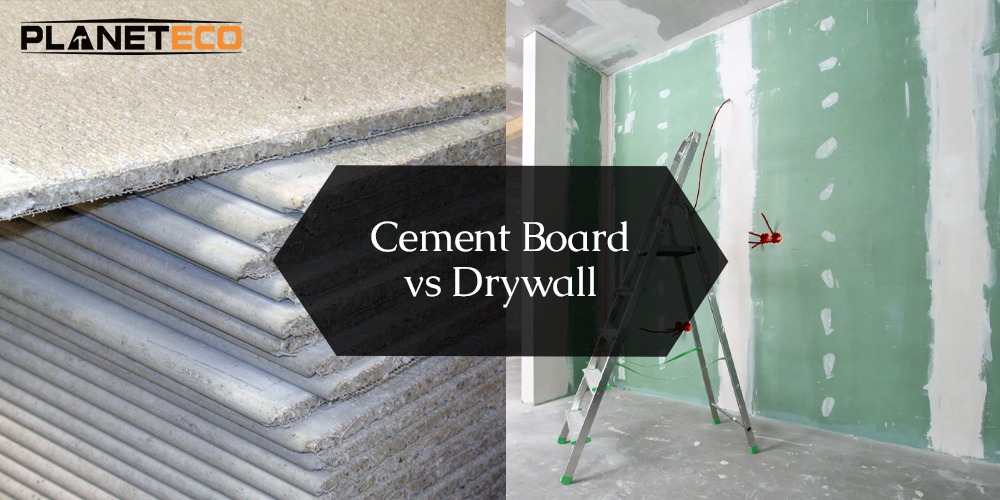When launching a construction or renovation project, choosing the right building material for your walls is important. Cement board and drywall are two famous options, each with distinct features, benefits, and ideal applications. While cement board is renowned for its durability and resistance to moisture, drywall is often preferred for its ease of installation and affordability. Understanding the key differences between these materials will help you decide which option best aligns with your exact project needs and environment.
What is a Cement Board?
Cement board is a durable building material composed mainly of cement, fibers, and fillers. It’s incredibly sturdy and resistant to moisture, making it perfect for challenging environments like bathrooms, kitchens, and exterior surfaces. Planeteco offers premium quality cement boards that ensure reliability in your projects.
Common Uses of Cement Board
Cement board is widely used for:
- Tile backing in wet areas
- Exterior siding and cladding
- Underlayment for floors and countertops
Pros of Cement Board
- Highly durable
- Resistant to moisture and mold
- Long-lasting even under harsh conditions
Cons of Cement Board
- Heavier and harder to install
- Generally more expensive
- Requires special tools for installation
What is Drywall?
Drywall, also known as gypsum board, consists of gypsum sandwiched between paper layers. It’s lightweight, cost-effective, and ideal for interior applications.
Common Uses of Drywall
You’ll commonly see drywall in:
- Interior walls
- Ceilings
- Living rooms, bedrooms, and offices
Pros of Drywall
- Lightweight and easy to install
- Affordable and readily available
- Easy to repair and replace
Cons of Drywall
- Susceptible to water damage
- Less durable than cement board
- Can attract mold and mildew if damp
Detailed Comparison Between Cement Board and Drywall
Durability
Cement boards win here, hands down. They withstand moisture, impact, and time far better than drywall.
Moisture Resistance
Again, cement board excels, especially in moisture-prone spaces like bathrooms. Drywall can deteriorate quickly if exposed to water.
Installation Process
Drywall is simpler and quicker to install perfect for DIY enthusiasts. Cement board requires special tools and more effort.
Cost Effectiveness
Drywall is budget-friendly. Cement boards might stretch your budget, but brands like Planeteco ensure greater longevity and value for money.
Fire Resistance
Both materials offer some fire resistance, but cement boards typically have better fire-resistant properties, ideal for enhanced safety.
Cement Board Applications
Bathrooms and Kitchens
Moisture-heavy areas demand cement boards to prevent mold and water damage.
Exterior Use
Ideal for exterior siding due to its resilience to harsh weather.
Floors and Countertops
Excellent support under tiles, enhancing durability.
Drywall Applications
Interior Walls
Perfect for standard walls in homes and offices, especially when moisture isn’t a concern.
Ceilings
Lightweight, making it suitable for ceiling installations.
Living and Bedroom Spaces
Affordable, practical, and easy to maintain, drywall is a standard choice for comfortable indoor environments.
When Should You Choose Cement Board?
Pick cement board if your project involves high moisture levels, heavy traffic areas, or outdoor environments. With brands like Planeteco, you get long-term durability and peace of mind.
When Should You Choose Drywall?
Opt for drywall when you have budget constraints, require quick installation, or need general-purpose interior walls and ceilings.
Maintenance Comparison
Maintaining Cement Board
Requires minimal upkeep, usually only occasional cleaning, as it’s resistant to mold and moisture.
Maintaining Drywall
Regular inspections are necessary, especially if moisture is a concern. Repairs can be straightforward but frequent in damp conditions.
Aesthetic Considerations
Finishing Options for Cement Board
Can be painted, tiled, or textured, but requires careful preparation due to its rough surface.
Finishing Options for Drywall
Easily painted, wallpapered, or textured, allowing endless design flexibility.
Environmental Impact
Eco-Friendliness of Cement Board
Cement board has a longer life span, making it environmentally beneficial in terms of reduced waste and replacement. Brands such as Planeteco focus on sustainability, enhancing eco-friendly practices.
Eco-Friendliness of Drywall
Drywall can be recycled, but its susceptibility to damage can lead to frequent replacements and waste.
DIY Installation Tips
Installing Cement Board Yourself
- Use protective gear
- Employ special tools (cement board cutter)
- Always ensure proper sealing at joints to avoid moisture intrusion
Installing Drywall Yourself
- Use standard tools (utility knives, screw guns)
- Sand joints smooth before painting
- Ensure proper alignment and secure fastening
Common Mistakes to Avoid
Cement Board Installation Mistakes
- Neglecting proper sealing and joint taping
- Underestimating weight and handling difficulties
Drywall Installation Mistakes
- Poor joint taping causing cracks
- Incorrect screw spacing leading to sagging or instability
Expert Recommendations
Professionals recommend cement boards, especially from reputable UAE-based brands like Planeteco, for moisture-prone and exterior areas, while drywall is preferred for internal, non-moisture-intensive spaces. Always match material choice with project needs, environment, and budget.
Conclusion
Choosing between cement board and drywall boils down to your project specifics durability needs, moisture exposure, installation ease, and cost factors. If you need strength and longevity, the cement board from Planeteco is the champion. For affordability and simplicity, drywall remains king. Think about what truly matters for your project before making your final choice.

